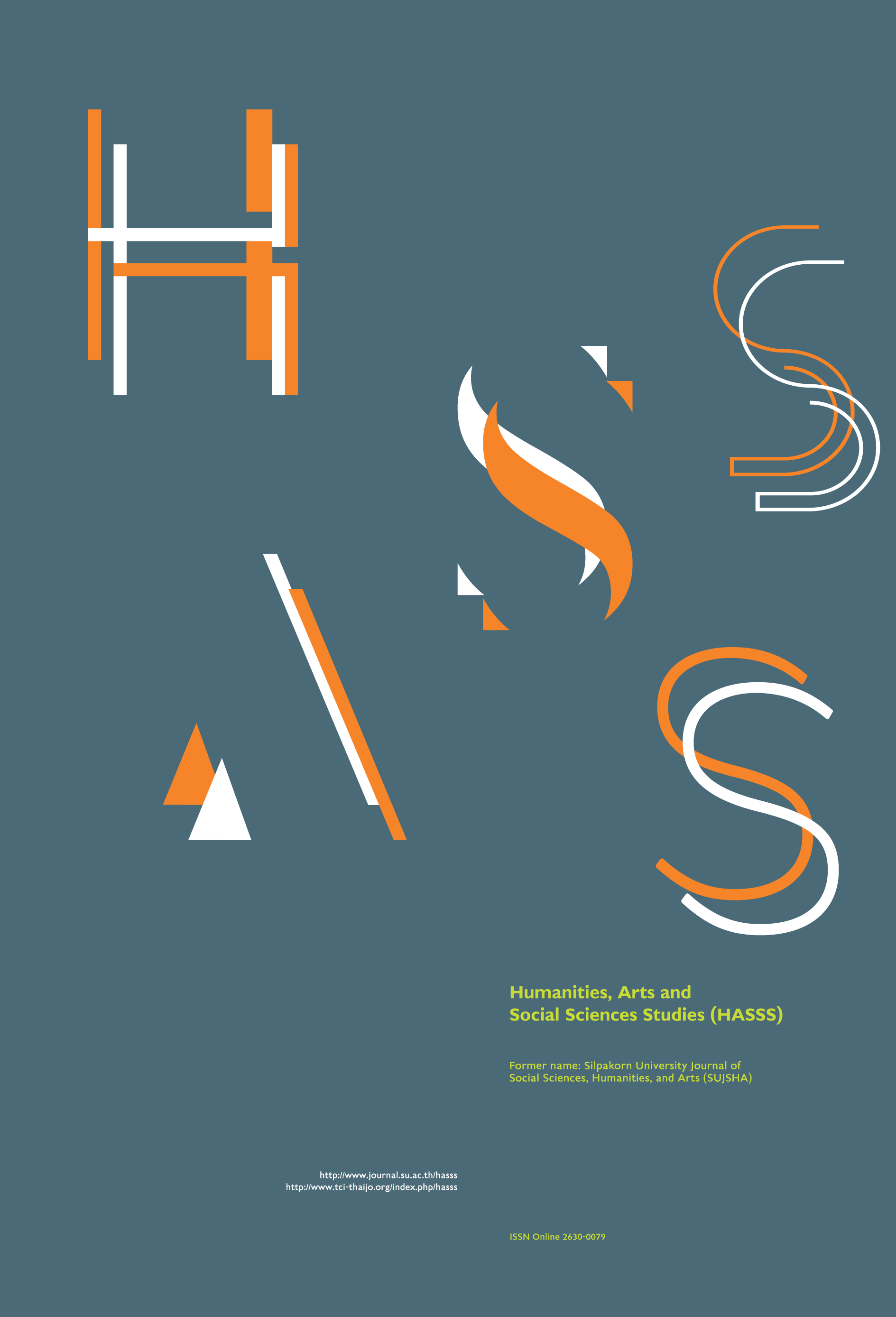Developing Attitudes of Primary School Students Towards Peers with Specific Learning Disorder Through Creative Stories
Main Article Content
Abstract
This research aimed at (1) investigating the attitudes of upper primary school students towards peers with specific learning disorder, and (2) examining the effect of creative stories on the attitudes of upper primary school students towards peers with specific learning disorder. In investigating the attitudes of the students, two hundred sixty-nine Grade 4-6 students in Bangkok, Thailand, responded to a questionnaire. It was found that the students generally had positive attitudes towards peers with specific learning disorder, although there were some negative attitudes related to misunderstanding about specific reading disorder. Comparing to non-academic oriented activities, the number of students with positive attitude towards interacting and supporting students with specific learning disorder decreased when the activities were academic oriented. In examining the effect of creative stories on the attitudes of upper primary school students, ten students from one classroom of each grade from Grade 4 - 6 in a school in Bangkok, Thailand, were purposely selected. It was found the scores from the attitude questionnaire of the students increased significantly after the reading of the books.
Downloads
Article Details
All rights reserved. Apart from citations for the purposes of research, private study, or criticism and review,no part of this publication may be reproduced, stored or transmitted in any other form without prior written permission by the publisher.
References
Adomat, D. S. (2014) Exploring Issues of Disability in Children's Literature Discussions. Disability Studies Quarterly 34(3). [Online URL: http://www.dsq-sds.org/article/view/3865/3644] accessed on October 20, 2019.
American Psychiatric Association. (2019) What Is Specific Learning Disorder? [Online URL: https://www.psychiatry.org/patients-families/specific-learning-disorder/what-is-specific-learning-disorder] accessed on October 20, 2019.
Artman-Meeker, K., Grant, T. O. and Yang, X. (2016) By the Book: Using Literature to Discuss Disability with Children and Teens. TEACHING Exceptional Children 48(3): 151-158.
Beardsley, D. A. (1981) Using Books to Change Attitudes Toward the Handicapped among Third Graders. The Journal of Experimental Education 50(2): 52-55.
Brook, U. and Geva, D. (2001) Knowledge and attitudes of high school pupils towards peers' attention deficit and learning disabilities. Patient Education and Counseling 43(1): 31-36.
de Boer, A., Pijl, S. J. and Minnaert, A. (2012) Students' Attitudes towards Peers with Disabilities: A Review of the Literature. International Journal of Disability, Development and Education 59(4): 379-392.
Eddington, D. (2015) Statistics for Linguists: A Step-by-Step Guide for Novices. Cambridge: Cambridge Scholars Publishing.
Favazza, P. C. and Odom, S. L. (1997) Promoting Positive Attitudes of Kindergarten-Age Children toward People with Disabilities. Exceptional Children 63(3): 405-418.
Kurtts, S. A. and Gavigan, K. W. (2017) Understanding (Dis)abilities through Children’s Literature. Education Libraries 31(3): 23-31.
Matthew, N. and Clow, S. (2007) Putting Disabled Children in the Picture: Promoting Inclusive Children’s Books and Media. International Journal of Early Childhood 39(2): 65-78.
McNicholas, C. (2010) Adolescents' Perceptions of Helmet-Wearing Peers. [Online URL: https://etd.ohiolink.edu/pg_10?0::NO:10:P10_ACCESSION_NUM:dayton1292035163] accessed on October 20, 2019.
Morgan, S., Walker, M., Bieberich, A. and Steven, B. (2017) Shared Activities Questionnaire (SAQ). [Online URL: www.researchgate.net/32035744_Shared_Activities_Questionnaire_SAQ] accessed on October 20, 2019.
Naemiratch, B. and Manderson, L. (2009) Pity and pragmatism: understandings of disability in northeast Thailand. Disability & Society 24(4): 475-488.
Office of the Council of State. (2008) Education Provision for Persons with Disabilities Act, B.E. 2551 (2008). [Online URL: http://web.krisdika.go.th/data/outsitedata/outsite21/file/Education_Provision_for_Persons_with_Disabilities_Act_BE_2551_(2008).pdf] accessed on October 20, 2019.
Office of the Education Council. (2018) Thailand's Educational Statistics 2016-2017. [Online URL: http://backoffice.onec.go.th/uploads/Book/1634-file.pdf] accessed on October 20, 2019.
Office of the Education Council. (2019) Education in Thailand 2018. [Online URL: https://pmnk.kkzone1.go.th/data/news3/24-02-2019-17-34-35_1344028011.pdf] accessed on October 20, 2019.
Ostrosky, M. M., Mouzourou, C., Dorsey, E. A., Favazza, P. C. and Leboeuf, L. M. (2015) Pick a Book, Any Book: Using Children’s Books to Support Positive Attitudes Toward Peers With Disabilities. Young Exceptional Children 18(1): 30-43.
Prater, M. A. (2000) Using Juvenile Literature with Portrayals of Disabilities in Your Classroom. Intervention in School and Clinic 35(3): 167-176.
Prater, M. A., Dyches, T. T. and Johnstun, M. (2006) Teaching Students about Learning Disabilities Through Children's Literature. Intervention in School and Clinic 42(1): 14-24.
Salend, S. J. and Moe, L. (1983) Modifying Nonhandicapped Students’ Attitudes toward Their Handicapped Peers through Children’s Literature. Journal for Special Educators 19(3): 22-28.
Siperstein, G. N. (1980) Development of the Adjective Checklist: An Instrument for Measuring Children’s Attitudes toward the Handicapped. Boston: University of Massachusetts.
Siperstein, G. N., Parker, R. C., Bardon, J. N. and Widaman, K. F. (2007) A National Study of Youth Attitudes toward the Inclusion of Students with Intellectual Disabilities. Exceptional Children 73(4): 435-455.
Sipsas-Herrmann, A. (1996) The Differential Effects of Fiction and Nonfiction Literature: Increasing Acceptance of Children with Disabilities. Paper presented at the Annual Meeting of the National Association of School Psychologists, Atlanta, GA. March 12-16.
Smith-D'Arezzo, W. M. and Moore-Thomas, C. (2010) Children's Perceptions of Peers with Disabilities. TEACHING Exceptional Children Plus 6(3). [Online URL: https://files.eric.ed.gov/fulltext/EJ879594.pdf] accessed on October 20, 2019.
Thai Ministry of Education. (2009) Classification and Criteria on Persons with Educational Disaiblities. [Online URL: http://www.mua.go.th/users/he-commission/doc/law/ministry%20law/1-42%20handicap%20MoE.pdf] accessed on October 20, 2019.
Trepanier-Street, M. L. and Romatowski, J. A. (1996) Young Children's Attitudes toward the Disabled: A Classroom Intervention Using Children's Literature. Early Childhood Education Journal 24(1): 45-49.
United Nations. (2018) UN Flagship Report on Disability and Development 2018. [Online URL: https://www.un.org/development/desa/disabilities/wp-content/uploads/sites/15/2018/12/UN-Flagship-Report-Disability.pdf] accessed on October 20, 2019.


